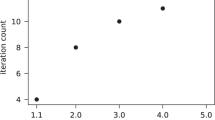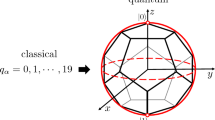Abstract
This work proposes and analyzes a methodology for finding least-squares solutions to the systems of polynomial equations. Systems of polynomial equations are ubiquitous in computational science, with major applications in machine learning and computer security (i.e., model fitting and integer factorization). The proposed methodology maps the squared-error function for a polynomial equation onto the Ising–Hamiltonian model, ensuring that the approximate solutions (by least squares) to real-world problems can be computed on a quantum annealer even when the exact solutions do not exist. Hamiltonians for integer factorization and polynomial systems of equations are implemented and analyzed for both logical optimality and physical practicality on modern quantum annealing hardware.



Similar content being viewed by others
References
Aharonov, D., Van Dam, W., Kempe, J., Landau, Z., Lloyd, S., Regev, O.: Adiabatic quantum computation is equivalent to standard quantum computation. SIAM Rev. 50(4), 755–787 (2008)
Albash, T., Lidar, D.A.: Adiabatic quantum computation. Rev. Mod. Phys. 90(1), 015002 (2018)
Alghassi, H., Dridi, R., Tayur, S.: Graver bases via quantum annealing with application to non-linear integer programs. arXiv preprint arXiv:1902.04215 (2019)
Andriyash, E., Bian, Z., Chudak, F., Drew-Brook, M., King, A.D., Macready, W.G., Roy, A.: Boosting Integer Factoring Performance via Quantum Annealing Offsets. D-Wave White Papers, Hanover (2016)
Barahona, F.: On the computational complexity of Ising spin glass models. J. Phys. A: Math. Gen. 15(10), 3241 (1982)
Biamonte, J., Wittek, P., Pancotti, N., Rebentrost, P., Wiebe, N., Lloyd, S.: Quantum machine learning. Nature 549(7671), 195 (2017)
Boixo, S., Rønnow, T.F., Isakov, S.V., Wang, Z., Wecker, D., Lidar, D.A., Martinis, J.M., Troyer, M.: Evidence for quantum annealing with more than one hundred qubits. Nat. Phys. 10(3), 218 (2014)
Boothby, K., Bunyk, P., Raymond, J., Roy, A.: Next-generation topology of d-wave quantum processors. D-Wave White Papers 22, 28 (2018)
Borle, A., Lomonaco, S.J.: Analyzing the quantum annealing approach for solving linear least squares problems. In: International Workshop on Algorithms and Computation, pp. 289–301. Springer, Berlin (2019)
Cai, J., Macready, W.G., Roy, A.: A practical heuristic for finding graph minors. arXiv preprint arXiv:1406.2741 (2014)
Chang, C.C., Gambhir, A., Humble, T.S., Sota, S.: Quantum annealing for systems of polynomial equations. Sci. Rep. 9(1), 10258 (2019)
Dattani, N.: Quadratization in discrete optimization and quantum mechanics. arXiv preprint arXiv:1901.04405 (2019)
Dridi, R., Alghassi, H.: Prime factorization using quantum annealing and computational algebraic geometry. Sci. Rep. 7, 43048 (2017)
Elgart, A., Hagedorn, G.A.: A note on the switching adiabatic theorem. J. Math. Phys. 53(10), 102202 (2012)
Golub, G.H., Van Loan, C.F.: Matrix Computations, 4th edn. Johns Hopkins University Press, Baltimore (2013)
Harrow, A.W., Hassidim, A., Lloyd, S.: Quantum algorithm for linear systems of equations. Phys. Rev. Lett. 103, 150502 (2009)
Jiang, S., Britt, K.A., McCaskey, A.J., Humble, T.S., Kais, S.: Quantum annealing for prime factorization. Sci. Rep. 8, 1–9 (2018)
Kadowaki, T., Nishimori, H.: Quantum annealing in the transverse Ising model. Phys. Rev. E 58(5), 5355 (1998)
Karimi, S., Ronagh, P.: Practical integer-to-binary mapping for quantum annealers. Quantum Inf. Process. 18(4), 94 (2019)
Khoshaman, A., Vinci, W., Denis, B., Andriyash, E., Amin, M.H.: Quantum variational autoencoder. Quantum Sci. Technol. 4(1), 014001 (2018)
Lasserre, J.B.: Global optimization with polynomials and the problem of moments. SIAM J. Optim. 11(3), 796–817 (2001)
Pakin, S.: Performing fully parallel constraint logic programming on a quantum annealer. Theory Pract. Logic Program. 18(5–6), 928–949 (2018)
Peng, X., Liao, Z., Xu, N., Qin, G., Zhou, X., Suter, D., Du, J.: Quantum adiabatic algorithm for factorization and its experimental implementation. Phys. Rev. Lett. 101(22), 220405 (2008)
Ray, P., Chakrabarti, B.K., Chakrabarti, A.: Sherrington–Kirkpatrick model in a transverse field: absence of replica symmetry breaking due to quantum fluctuations. Phys. Rev. B 39(16), 11828 (1989)
Rosenberg, I.G.: Reduction of bivalent maximization to the quadratic case. Cahiers du Centre d’etudes de Recherche Operationnelle 17, 71–74 (1975)
Santoro, G.E., Martoňák, R., Tosatti, E., Car, R.: Theory of quantum annealing of an Ising spin glass. Science 295(5564), 2427–2430 (2002)
Shor, P.W.: Polynomial-time algorithms for prime factorization and discrete logarithms on a quantum computer. SIAM Rev. 41(2), 303–332 (1999)
Steane, A.: Quantum computing. Rep. Prog. Phys. 61(2), 117 (1998)
Subaşı, Y.B.U., Somma, R.D., Orsucci, D.: Quantum algorithms for systems of linear equations inspired by adiabatic quantum computing. Phys. Rev. Lett. 122, 060504 (2019)
Watson, L.T., Sosonkina, M., Melville, R.C., Morgan, A.P., Walker, H.F.: Algorithm 777: Hompack90: a suite of fortran 90 codes for globally convergent homotopy algorithms. ACM Trans. Math. Softw. (TOMS) 23(4), 514–549 (1997)
Wen, J., Kong, X., Wei, S., Wang, B., Xin, T., Long, G.: Experimental realization of quantum algorithms for a linear system inspired by adiabatic quantum computing. Phys. Rev. A 99, 012320 (2019)
Acknowledgements
The authors would like to thank Wu-chun Feng and Mohamed W. Hassan for their council and feedback. Also, the authors would like to acknowledge the anonymous reviewers for their helpful comments, which greatly improved this paper.
Author information
Authors and Affiliations
Corresponding author
Additional information
Publisher's Note
Springer Nature remains neutral with regard to jurisdictional claims in published maps and institutional affiliations.
Rights and permissions
About this article
Cite this article
Chang, T.H., Lux, T.C.H. & Tipirneni, S.S. Least-squares solutions to polynomial systems of equations with quantum annealing. Quantum Inf Process 18, 374 (2019). https://doi.org/10.1007/s11128-019-2489-x
Received:
Accepted:
Published:
DOI: https://doi.org/10.1007/s11128-019-2489-x




